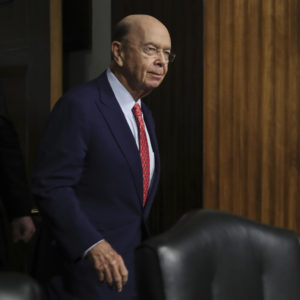Commerce Secretary Wilbur Ross outlined his main trade objectives Monday while speaking to reporters in Washington D.C.
President Donald Trump and his administration have made international trade a top priority. He has blamed current trade agreements for causing hardships for the working class including fewer job opportunities. Ross discussed what the administration is doing to reform trade policies during a luncheon at the National Press Club.
Secretary Ross noted particular concern over the trade deficit the country has with China. The administration has been in discussions with China to rework trade policies while also threatening to levy tariffs against them over alleged unfair trade practices. Ross opened up his speech with two questions about China.
“Does anyone doubt that China’s trade surplus with us has helped their economic growth?” Ross asked. “If their surplus with us has been good for China, how can trade deficits with them not be bad for us? I believe that deficits and surpluses do matter. But not all trade deficits are the same.”
Ross adds that a country shouldn’t be criticized for having a trade deficit with us for simply fulfilling our needs – like providing a resource we’re not producing enough of. He called it a “no blame” trade relationship. But trade deficits caused by artificial means, he argued, like one-sided tariffs and other barriers are not blameless.
China has imposed much higher tariffs, according to Ross, in 21 out of 23 major product categories. He adds that the United States can’t really turn to intergovernmental trade organizations like the World Trade Organization for help – since member countries generally want more access to American markets.
“The United States is the most open and the most exploited market in the world,” Ross said. “Both China and Europe openly espouse free trade rhetoric. But in actual practice are far more protectionist than the United States. Our trade policy’s main objective is to make their real-world behavior match their free trade speeches. The second objective is to have our trading partners abide by the rules.”
Ross adds that the third objective is to fix mistakes from past administrations. He criticized trade concessions with countries like China for being permanent. He argues that such concessions needed to be open for review and adjustments as time goes on. What works today might not work tomorrow.
“Why does all of this matter?” Ross said. “Because the U.S. trade deficit is the largest in the world. It is unreasonable for one country to bear the burden of bolstering the economic fortunes of the entire planet. The U.S. is one of the least protectionist major country and we have deficits to show for it.”
President Trump has worked to reform immigration and trade in ways that prioritize domestic workers. His administration is currently renegotiating trade agreements like the North American Free Trade Agreement (NAFTA). Some experts have expressed concern over rhetoric that the administration would be willing to pull out.

